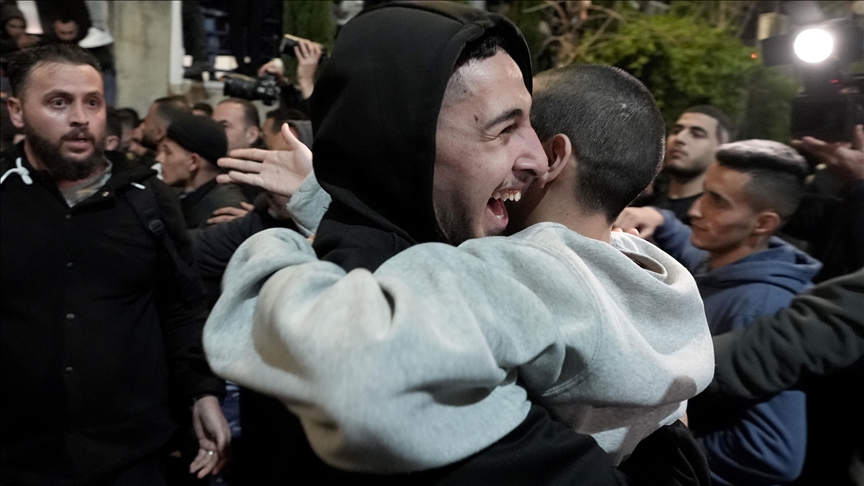Freed Palestinian teen: Israeli jails meant humiliation, beatings and disease
Reda Obaid, 18, says Israeli authorities ignored a court order for his medical treatment
 File Photo from Ramallah, West Bank. 110 Palestinian hostages freed in third round of hostages swap deal between Hamas and Israel
File Photo from Ramallah, West Bank. 110 Palestinian hostages freed in third round of hostages swap deal between Hamas and Israel
GAZA CITY, Palestine
Despite the joy the family of 18-year-old Reda Obaid felt in welcoming him home to their residence in East Jerusalem’s Isawiya neighborhood, they were shocked to see his body covered in scabies, a skin disease he contracted while languishing in an Israeli prison.
His father, Mohammed, immediately took him to a hospital for medical evaluation upon seeing his condition outside Jerusalem’s Moscobiyeh Prison, where Israeli authorities released him on Thursday.
Obaid was among 110 Palestinian detainees freed in the third phase of a prisoner exchange deal. In return, the Palestinian group Hamas and Islamic Jihad released three Israelis and five Thai nationals held in Gaza.
Arrest and hardship
Israeli forces arrested Obaid on Aug. 21, 2024, initially placing him in a juvenile detention facility before transferring him to an adult prison. He described conditions in both as inhumane.
“The prison experience was brutal—disease, malnutrition, beatings and sleepless nights. Prisoners endure only humiliation and abuse,” Obaid told Anadolu at his home.
“In the juvenile facility, inmates were constantly beaten and insulted,” he said. “When they moved me to the adult prison, it was no different. If a guard asked a question and I didn’t answer quickly, I was beaten.”
Obaid recalled his time at Megiddo Prison, where inadequate bedding forced him to sleep without a blanket for the first 10 days.
Battling disease
Obaid said he developed scabies shortly after his arrest.
“When I appeared in court, I pleaded with the judge for medical treatment. She ordered a transfer to the prison clinic, but the authorities ignored it,” he said.
“One prison official saw my condition but did nothing,” Obaid added.
He said many detainees suffered from the same skin disease but were only given ointments and pills that provided no relief.
A Bittersweet freedom
Obaid never expected to be among those released.
“I was supposed to serve five years, so when I heard my name on the list, I was overjoyed. I couldn’t wait to reunite with my family and get proper treatment. Scabies drained me, and no one in prison cared,” he said.
His father shared mixed emotions about his son’s return, as his other son, Dia, 19, remains behind bars.
“Before the prisoner swap, Reda had several court hearings. I thought both my sons would be freed, but only Reda was released,” Mohammed told Anadolu.
“I got a call from Israeli intelligence early Thursday summoning me. I never expected such a deal,” he added.
Mohammed said he was only able to see his son in court hearings and had no information about his well-being in prison.
“I didn’t know what he ate or how he slept. Now my son Dia remains in prison, and I have no updates on him,” he said.
“During a court appearance, he told me he was beaten, and the bruises were visible.”
Celebration ban
Mohammed said Israeli intelligence warned him against holding a public gathering to celebrate his son’s release.
“They told me no crowds, no friends visiting. It was forbidden,” he said.
Before the detainees were released in Jerusalem, families gathered outside Moscobiyeh Prison to receive their loved ones.
“But before I could even see Reda, authorities confiscated our phones and held us in a confined area without food. Even bathroom access required permission,” he said.
Mohammed was horrified when he saw his son’s condition.
“I was in shock. I had never seen anything like it before,” he said.
“After endless delays, I took him to the hospital in an ambulance to get medical care.”
The first phase of the prisoner exchange began on Jan. 19, with three Israeli women freed in exchange for 90 Palestinian detainees—women and minors—from the occupied West Bank, including Jerusalem.
In the second phase, Israel released 199 Palestinian detainees and a Jordanian prisoner in exchange for four Israeli women soldiers held in Gaza.
Under the three-stage agreement, lasting 42 days per phase, Israel agreed to release between 1,700 and 2,000 Palestinian and Arab detainees in exchange for 33 Israeli captives in Gaza, whether alive or deceased.
Israel’s genocidal war has killed more than 47,500 Palestinians, most of them women and children, and injured over 111,600 since Oct. 7, 2023.
The Israeli onslaught on Gaza has left more than 11,000 people missing, with widespread destruction and a humanitarian crisis that has claimed the lives of many elderly people and children in one of the worst-ever global humanitarian disasters.
The International Criminal Court issued arrest warrants last November for Israeli Prime Minister Benjamin Netanyahu and his former Defense Minister Yoav Gallant for war crimes and crimes against humanity in Gaza.








